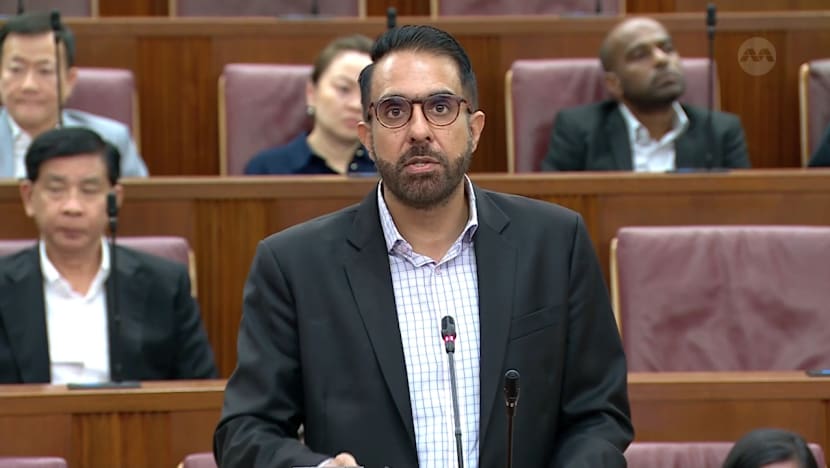Both 'we' and 'me' matter to Singaporeans: Workers' Party chief Pritam Singh in debate on President’s Address
"We should aim for excellence as individuals, and venture forth with confidence as individuals, and be respected by society as individuals," said the Leader of the Opposition.

Leader of the Opposition Pritam Singh speaks in parliament on Sep 22, 2025.

This audio is generated by an AI tool.
SINGAPORE: The idea of "we" is key to Singaporeans, but it does not mean suppressing the importance and central role of the individual, said Leader of the Opposition Pritam Singh on Monday (Sep 22).
Speaking in Parliament on the first day of the debate on the President's Address, Mr Singh said that "we" and "me" are perspectives that "exist on a continuum".
Said the Workers' Party (WP) chief: "A binary treatment is limiting, while an overemphasis on one is not consistent with our lived experiences.
"We should aim for excellence as individuals, and venture forth with confidence as individuals, and be respected by society as individuals, regardless of race, language, religion and backgrounds."
Earlier this month, President Tharman Shanmugaratnam called on Singaporeans to embrace a "we first" mindset and prioritise the collective good as the country enters a new phase of economic transformation.
“We will nurture a 'we first' society at every level, starting in the community,” Mr Tharman said on Sep 5, adding that Singaporeans must “put the collective before self”.
Mr Tharman's remarks came at the opening of the 15th Parliament, where he laid out the government’s agenda for the term ahead.
The president's call echoed Prime Minister Lawrence Wong's message at last month’s National Day Rally, where he urged Singaporeans to adopt a “we first” attitude, emphasising shared responsibility and collective resilience.
Putting "we before me" is a "simple idea, but a timeless one", said Mr Singh on Monday.
"Singapore has wrestled with the ambit of such communitarian concepts in the past, but one can understand the significance of reiterating this call in light of present times."
On this point, he noted how past People's Action Party MPs, during a past debate on a white paper on shared values in 1991, had also argued that such values should not be an excuse to stamp out individual ideas.
Drawing on more recent reflections, Mr Singh said that in a conversation series after the COVID-19 pandemic, Singaporeans were most concerned about national identity, shared values and social support, as opposed to bread-and-butter issues.
To this, the opposition leader said that both "we" and "me" matter to Singaporeans.
"A sense of personal fulfilment and purpose is more likely to be achieved when we contribute to something larger than ourselves and aim beyond self-enrichment and personal outcomes," he said.
"Perhaps the most important point to be made here is that Singaporeans are well and truly in the driver's seat of shaping the Singapore they want to see."
A "STRONG NUDGING EFFECT"
During his speech, Mr Singh also laid out his party's priorities.
"Five years ago, at the opening of parliament then, I said that the Workers' Party will chart an independent path and fulfil its duty as a loyal opposition," he said.
"Our loyalty is to the people and to the nation, and this term, fidelity to the three key functions of Parliament - to make laws, to check on the government and to scrutinise the state's finances - will come into distinct focus."
While some think that WP Members of Parliament (MPs) are trying to "embarrass the government" by asking questions, the party does not see it that way, said Mr Singh.
"Checking the government is a function of system design. This is something our early leaders understood, and is an essential feature of the Westminster system we adopted from the British.
"To borrow an old tech phrase - questioning the government in parliament is a feature, not a bug," he added.
"Embracing this feature will be an important priority for the Workers' Party in this term of parliament. Where alternative proposals and improvements to existing policies need to be raised, we will raise them accordingly."
Following the last general election, the WP’s overall parliamentary presence, including its Non-Constituency MPs (NCMPs), has grown to 12 seats, the largest in its history.
Mr Singh added that his party will not file parliamentary questions to "rack up numbers".
"Every question we ask is one that needs asking, especially since the opposition does not receive any special government briefings, unlike the PAP MPs, and neither are there parliamentary select committees to scrutinise the work of the various ministries when parliament is not in session," he said.
"We believe that the prospect of the opposition raising issues in parliament has a strong nudging effect in getting the issues recognised and addressed by the government."
Mr Singh cited the recent spate of MRT breakdowns, which he said many Singaporeans find to be "highly unusual, particularly after significant taxpayer resources have been expended to raise rail reliability over the last decade".
"This will have to be scrutinised in parliament, including the findings and recommendations of the recently established task force under LTA's (Land Transport Authority's) purview," he added.
Earlier in the day, Acting Minister for Transport Jeffrey Siow spoke in response to 18 parliamentary questions filed on rail reliability.
Responding to Mr Singh's speech, Mr Siow said he welcomed any questions from any MP on transport matters.
"My approach is to be open and transparent, and thus I welcome the Leader of Opposition, Mr Pritam Singh's earlier comments about how the Workers' Party will scrutinise the work of the MOT (Ministry of Transport) and the rail reliability task force," he said.
















